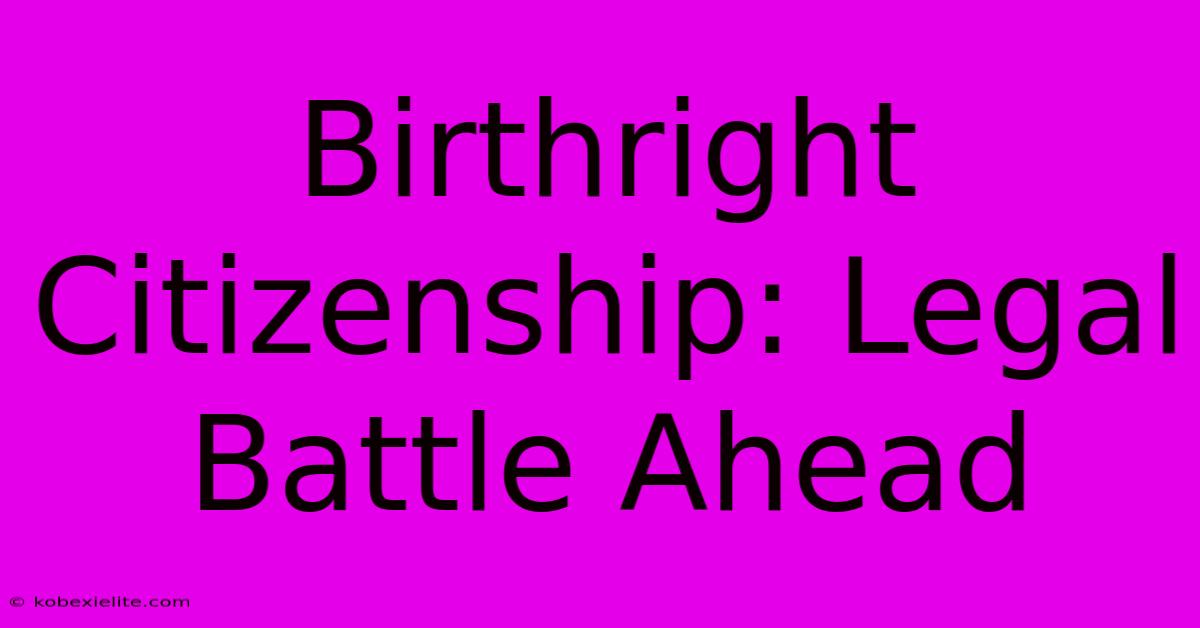Birthright Citizenship: Legal Battle Ahead

Discover more detailed and exciting information on our website. Click the link below to start your adventure: Visit Best Website mr.cleine.com. Don't miss out!
Table of Contents
Birthright Citizenship: Legal Battle Ahead
The principle of birthright citizenship, enshrined in the 14th Amendment of the U.S. Constitution, is facing renewed legal challenges and intense political debate. This article delves into the ongoing legal battles surrounding birthright citizenship, exploring its historical context, the arguments for and against its continuation, and the potential implications of its repeal or modification.
Understanding Birthright Citizenship: The 14th Amendment
The 14th Amendment, ratified in 1868, states: "All persons born or naturalized in the United States and subject to its jurisdiction, are citizens of the United States and of the State wherein they reside." This clause, often referred to as the jus soli principle (right of soil), grants citizenship automatically to anyone born within U.S. borders, regardless of their parents' immigration status. This contrasts with jus sanguinis (right of blood), where citizenship is derived from one's parents.
Historical Context and Intent
The 14th Amendment was enacted in the aftermath of the Civil War, primarily to guarantee citizenship to formerly enslaved African Americans. The intent was to secure equal rights and protections under the law for all persons born within the United States. However, the precise interpretation of the "subject to its jurisdiction" clause has been a source of ongoing legal and political contention.
The Arguments For and Against Birthright Citizenship
The debate surrounding birthright citizenship is deeply polarized.
Arguments in Favor:
- Constitutional Guarantee: Supporters argue that birthright citizenship is a fundamental right guaranteed by the 14th Amendment and should not be altered without a constitutional amendment. They emphasize the amendment's historical context and the importance of upholding its original intent.
- National Unity and Social Cohesion: Maintaining birthright citizenship fosters a sense of national unity and inclusion, integrating new generations into the social and political fabric of the country.
- Practical Challenges of Implementation: Altering birthright citizenship would create immense logistical and administrative hurdles, requiring a complex and potentially discriminatory system of birth registration and citizenship determination.
- Economic Contributions: Many children born to undocumented immigrants grow up to be contributing members of society, paying taxes and contributing to the economy. Denying them citizenship could negatively impact economic growth.
Arguments Against:
- National Security Concerns: Opponents raise concerns about national security, arguing that birthright citizenship could potentially be exploited by individuals seeking to gain illegal access to the United States.
- Strain on Public Resources: Some argue that birthright citizenship puts an undue strain on public resources, such as schools and healthcare, particularly in areas with large immigrant populations.
- "Anchor Babies": A controversial and often inflammatory term, "anchor babies" refers to children born to undocumented immigrants solely for the purpose of gaining legal status for the parents. While such instances likely exist, their prevalence is a subject of debate.
- Unintended Consequences: Critics warn that abolishing or modifying birthright citizenship could lead to unintended consequences, such as creating a permanent underclass of stateless individuals.
The Legal Battles Ahead: Challenges and Potential Outcomes
Several legal challenges to birthright citizenship have been launched in recent years, although none have yet successfully overturned the established precedent. These challenges often focus on interpreting the "subject to its jurisdiction" clause of the 14th Amendment, arguing that children born to undocumented immigrants are not fully subject to U.S. jurisdiction.
The potential outcomes of these legal battles are uncertain, but they could significantly impact the lives of millions of Americans. Any changes to birthright citizenship would require either a Supreme Court ruling overturning existing precedent or a constitutional amendment, both of which are unlikely in the near future. However, the political debate is likely to continue, potentially shaping future immigration policies and legal challenges.
In Conclusion: The future of birthright citizenship remains uncertain, entangled in complex legal and political considerations. Understanding the historical context, the arguments on both sides, and the potential ramifications of any change is crucial for informed public discourse and effective policymaking. The ongoing legal battles represent a significant turning point in the ongoing discussion surrounding immigration and citizenship in the United States.

Thank you for visiting our website wich cover about Birthright Citizenship: Legal Battle Ahead. We hope the information provided has been useful to you. Feel free to contact us if you have any questions or need further assistance. See you next time and dont miss to bookmark.
Featured Posts
-
Taxpayer Victory Callaghan Innovation Ends
Jan 23, 2025
-
Understanding Trumps Dei Program Ban
Jan 23, 2025
-
Galaxy S25 Edge Thinner Than Apples I Phone
Jan 23, 2025
-
Stream Arsenal Vs Dinamo Zagreb Champions League Match
Jan 23, 2025
-
Bristol Draw Wells Finds The Net
Jan 23, 2025
